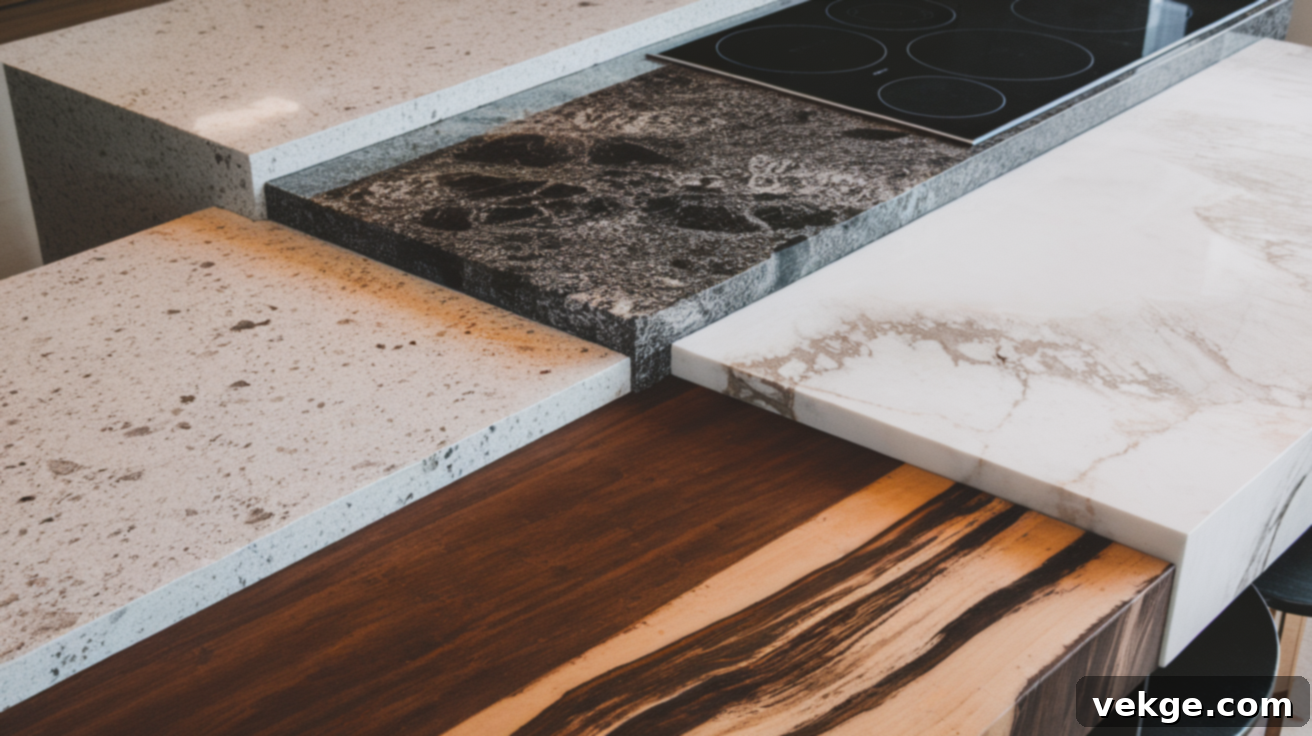The Ultimate Guide to Choosing the Best Kitchen Countertop Materials for Your Home
Choosing the right countertop material is one of the most significant decisions you’ll make when designing or renovating your kitchen. As the heart of your home, your kitchen demands surfaces that are not only beautiful and reflective of your personal style but also incredibly durable, functional, and easy to maintain. Countertops are subject to daily wear and tear – from cooking preparations and accidental spills to the occasional dropped utensil or hot pan. Finding that perfect balance between aesthetics, longevity, and budget can feel overwhelming, but you’re not alone in this journey.
Having guided countless homeowners through the vast array of options, I understand the challenges and considerations involved. This comprehensive guide is designed to simplify the process, breaking down the most popular countertop materials, comparing their unique advantages and disadvantages, and helping you determine what truly works best for your specific needs and lifestyle. By the end, you’ll feel confident in answering the big question: what is the best countertop material for your home?
What Are the Top Countertop Materials to Consider?
While the “best” countertop material is subjective and depends heavily on individual preferences and priorities, some materials consistently rank high for their blend of durability, aesthetics, and value. Here’s a quick overview of the leading contenders, each offering distinct benefits for different kitchen styles and demands:
- Quartz: Engineered for durability and beauty, quartz is a non-porous, low-maintenance, and stylish choice, making it ideal for the demands of most modern homes.
- Granite: A timeless natural stone, granite boasts exceptional strength, heat resistance, and unique patterns, making it a stellar option for upscale, classic kitchens.
- Laminate: Offering an unbeatable combination of affordability and ease of installation, laminate is perfect for budget-conscious projects or temporary setups.
- Butcher Block: This warm, natural wood surface provides a rustic charm and is excellent for food preparation, though it requires consistent oiling and care.
- Stainless Steel: Known for its sleek, hygienic properties, stainless steel is a top choice for modern, industrial, or commercial-style kitchens.
- Marble: Synonymous with luxury and elegance, marble adds a sophisticated touch but comes with higher maintenance needs due to its porosity and susceptibility to etching.
- Quartzite: A natural stone that offers the look of marble with the durability of granite, quartzite is very hard but typically requires sealing.
- Dekton: An ultra-compact surface, Dekton is remarkably durable, resistant to heat, scratches, and UV rays, making it a premium, cutting-edge option.
- Solid Surface (Corian): Celebrated for its seamless appearance and repairability, solid surface materials offer moderate durability and a wide range of colors.
Exploring the Most Durable and Popular Countertop Materials in Detail
Each countertop material presents a unique set of features, benefits, and considerations. Understanding these nuances is crucial for making an informed decision that will serve your home beautifully for years to come. Let’s delve deeper into some of the most sought-after options.
1. Quartz Countertops: The Modern Workhorse
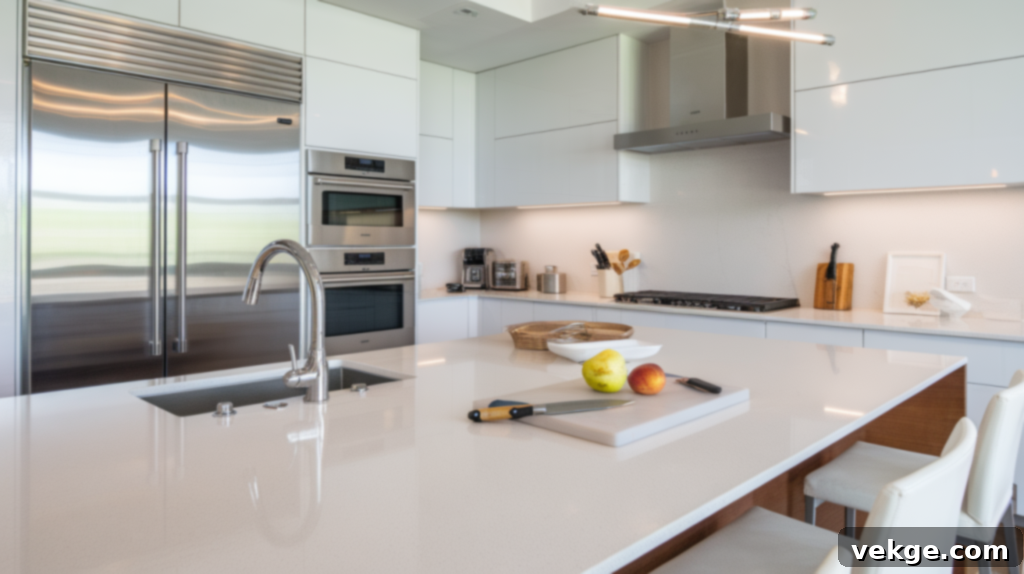
Quartz countertops are engineered stone surfaces made from approximately 90-95% ground quartz, combined with resins, polymers, and pigments. This composition results in a remarkably hard, non-porous surface that offers impressive durability and incredibly low maintenance. Unlike natural stone, quartz never needs sealing, making it highly resistant to stains, bacteria, and scratches. Its non-porous nature also means it won’t harbor germs, contributing to a more hygienic kitchen environment.
Available in an extensive array of colors, patterns, and finishes—many mimicking the look of natural stone like marble or granite without the associated upkeep—quartz seamlessly suits modern, contemporary, and even traditional kitchen designs. While it is generally more expensive than materials like laminate or some granites, its longevity, ease of care, and consistent aesthetic make it a valuable investment. Quartz is ideal for busy kitchens and high-end designs, perfectly suited for frequent cooking and entertaining where durability and ease of maintenance are paramount.
2. Granite Countertops: Timeless Natural Elegance
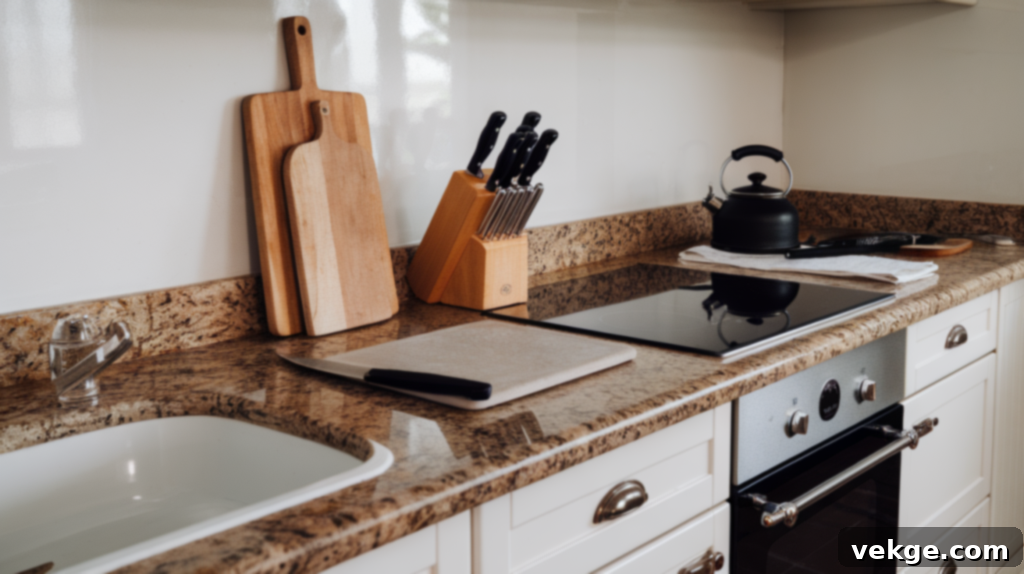
Granite remains a classic and highly popular choice for kitchen countertops, celebrated for its unique natural beauty, exceptional heat resistance, and inherent durability. Formed deep within the Earth from molten rock, each slab of granite is distinct, offering one-of-a-kind patterns and color variations that add character and depth to any kitchen. It can withstand hot pots and pans directly from the stove and is highly resistant to scratches and chips, making it a robust surface for daily culinary activities.
While granite is incredibly hard, it is a porous natural stone, meaning it requires regular sealing—typically once a year—to prevent stains from liquids like wine, oil, or coffee. Proper sealing protects the surface and ensures its long-lasting beauty. Granite is perfect for classic kitchens, rustic farmhouses, and cooking spaces that endure heavy use, providing a luxurious and resilient surface that enhances home value. Its ability to withstand the rigors of a busy kitchen while maintaining its striking appearance makes it a preferred material for many homeowners seeking both function and sophisticated style.
3. Marble Countertops: Unmatched Luxury and Grace
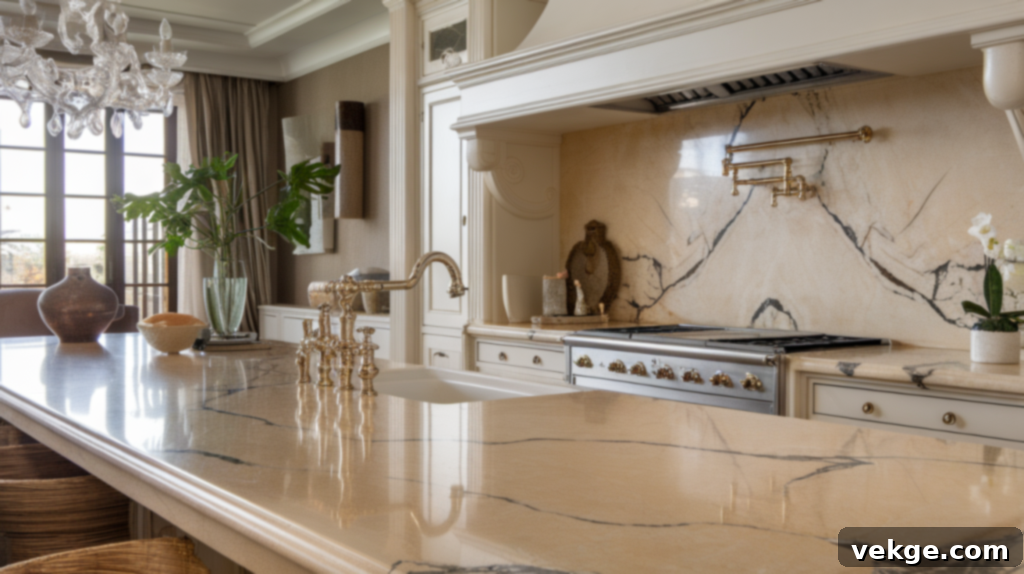
Marble countertops are synonymous with luxury, elegance, and timeless beauty. Renowned for its distinctive veining and soft, luminous appearance, marble has been a prized material in architecture and design for centuries. Its sophisticated look can instantly elevate the aesthetic of any kitchen or bathroom, creating a sense of grandeur and refinement. Marble is also naturally cool, making it an excellent surface for baking and pastry making.
However, marble is a softer and more porous stone than granite or quartzite, making it more susceptible to staining, scratching, and etching from acidic substances (like lemon juice or vinegar). This vulnerability means it requires frequent and diligent maintenance, including regular sealing and prompt cleanup of spills, to preserve its pristine condition. Despite its demanding upkeep, marble remains a top choice for those who prioritize unparalleled beauty and are willing to invest in its care. It’s best suited for graceful kitchens, luxury homes, and areas where its delicate charm can be appreciated, adding an undeniable touch of class.
4. Laminate Countertops: Budget-Friendly Versatility
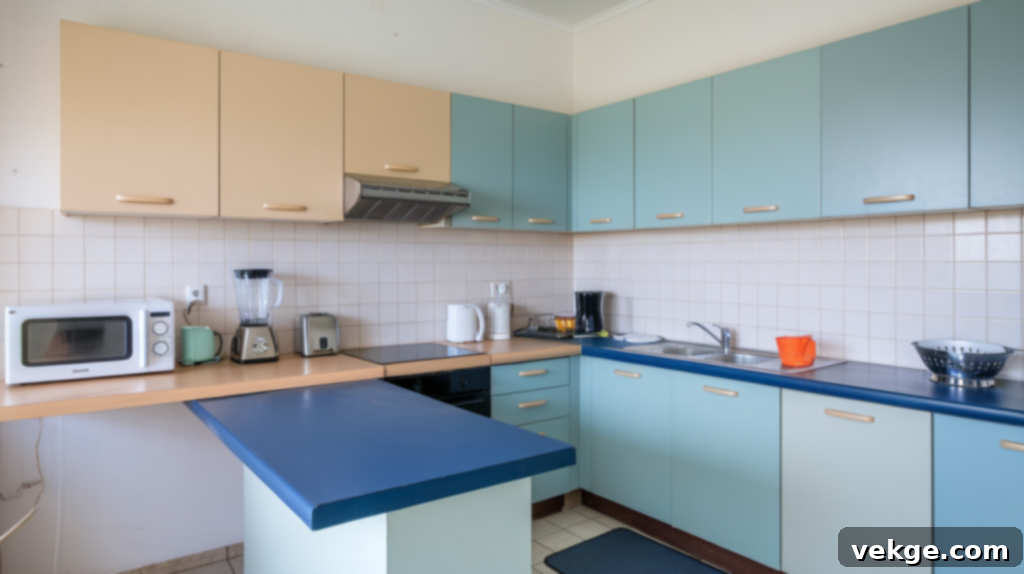
Laminate countertops offer an incredibly affordable and versatile solution for kitchens on a budget. Composed of layers of paper or plastic bonded to a particleboard core, laminate comes in an astonishing array of colors, patterns, and textures, including convincing reproductions of natural stone, wood, and abstract designs. This wide selection makes it incredibly easy to find a style that complements any kitchen decor, from traditional to contemporary. Beyond its low cost, laminate is also very easy to clean and maintain, requiring just a simple wipe-down with soap and water.
However, laminate is less durable than stone or engineered surfaces. It is prone to scratches, chipping, and can be damaged by excessive heat, making hot pads and cutting boards essential. Over time, it can show wear, especially at seams and edges, and damage is typically not repairable. While not a long-term premium solution, laminate is an excellent choice for temporary setups, rental properties, or kitchens where budget is the primary concern, offering a quick and attractive update without a significant financial commitment.
5. Butcher Block Countertops: Warmth and Natural Appeal
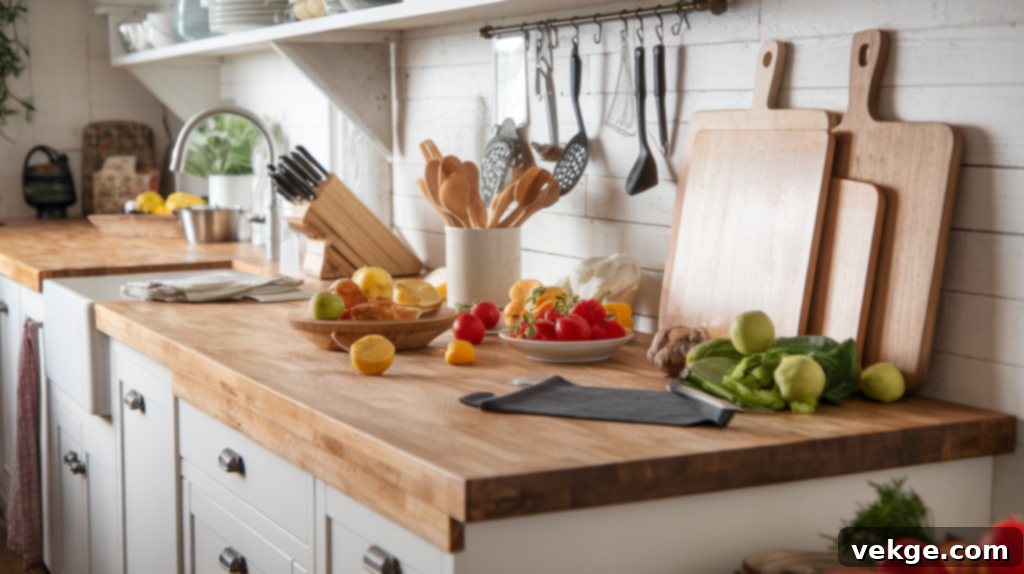
Butcher block countertops bring a unique warmth, natural beauty, and inviting texture to any kitchen. Made from solid wood strips glued together, they offer a rustic charm that is especially popular in farmhouse, traditional, and transitional kitchen designs. Beyond their aesthetic appeal, butcher block surfaces are excellent for food preparation, providing a forgiving surface that’s gentle on knives. They are available in various wood species, each offering different grain patterns and colors, from light maple to rich walnut.
While easy to maintain for daily cleaning, butcher block requires more consistent care than stone or engineered surfaces. It is less durable against deep scratches and burns, and prolonged exposure to moisture can lead to warping or staining. Regular oiling (every few weeks or months, depending on use) is crucial to maintain its moisture resistance, prevent cracking, and enhance its natural luster. Small scratches and dents can often be sanded out, allowing for restoration. Butcher block is a fantastic choice for those seeking an organic, evolving surface that adds character and warmth, particularly well-suited for a dedicated food prep area or a central island.
6. Quartzite Countertops: Nature’s Durable Gem
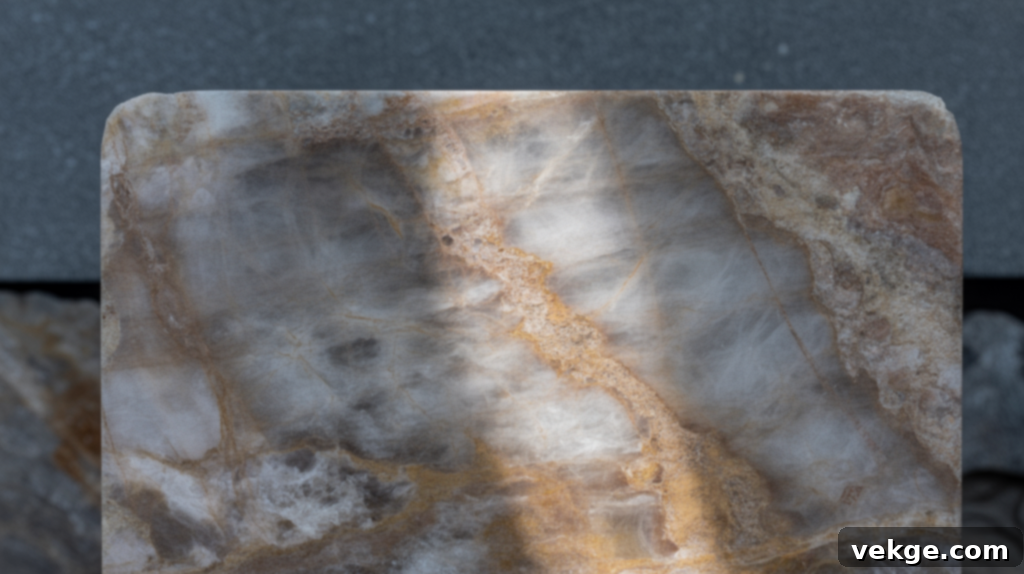
Natural quartzite is a metamorphic rock formed when sandstone undergoes intense heat and pressure deep within the Earth. This geological process transforms sandstone into one of the hardest and most durable natural stone surfaces available for countertops. Many people mistakenly confuse natural quartzite with engineered quartz; however, quartzite is a purely natural stone, prized for its raw beauty and remarkable resilience. It offers the aesthetic appeal often associated with marble, with elegant veining and soft color palettes, but with the superior strength and durability comparable to granite.
Quartzite is highly resistant to heat, scratches, and etching, making it an excellent choice for busy kitchens. Like granite, it is a porous natural stone and typically requires periodic sealing to enhance its stain resistance, though some denser varieties may require less frequent sealing. Its robust nature makes it a fantastic investment for homeowners seeking the sophisticated look of marble combined with exceptional longevity and lower maintenance demands than marble. Quartzite slabs vary widely, offering unique patterns and colors, ensuring your countertop will be one-of-a-kind and a true centerpiece in your kitchen.
7. Stainless Steel Countertops: Professional and Hygienic
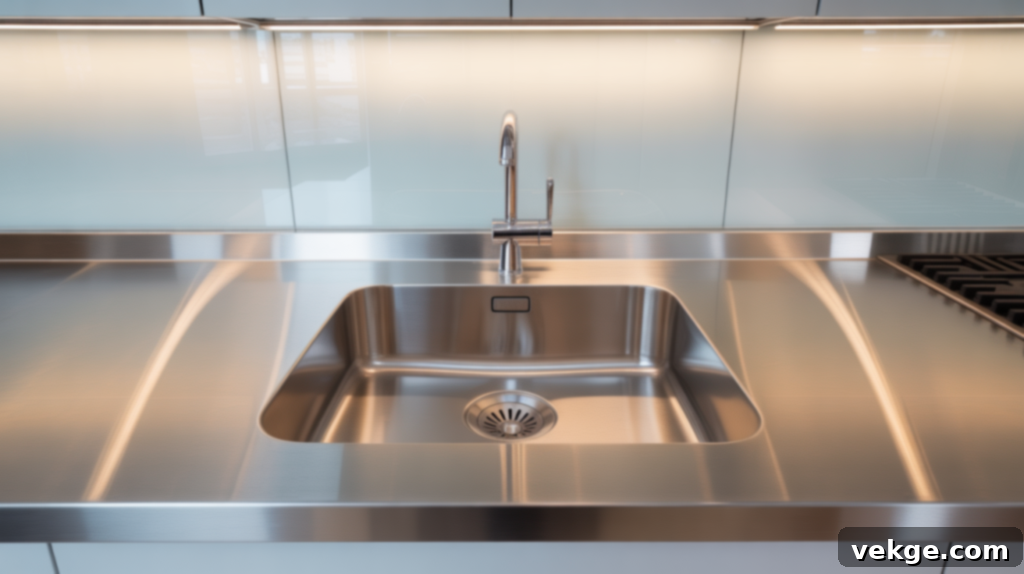
Stainless steel countertops are a staple in commercial kitchens for a reason: they are incredibly durable, hygienic, and can handle virtually any cooking task safely and effectively. This material naturally resists heat, stains, and bacteria, making it one of the easiest surfaces to clean and sanitize. Its non-porous surface ensures that no liquids or germs can penetrate, contributing to a truly sterile food preparation environment, which is a major advantage for avid home cooks and those concerned with hygiene.
Modern stainless steel counters are no longer confined to industrial aesthetics. They now come in a variety of finishes, from brushed to matte, and different thicknesses, allowing for greater design flexibility in residential settings. Many installations feature integrated sinks and backsplashes, creating a seamless and ultra-clean look. While highly functional, stainless steel can show fingerprints and scratches, which some consider part of its “professional” patina. Ideal for modern, industrial, or minimalist kitchen designs, stainless steel offers a sleek, professional, and long-lasting surface that is virtually indestructible.
Other Noteworthy Countertop Materials Worth Considering
Beyond the most common options, several other materials offer unique characteristics that might be the perfect fit for your specific design vision or practical needs. These choices often provide distinct textures, customizability, or eco-friendly benefits.
1. Concrete Countertops: Industrial Chic and Customization
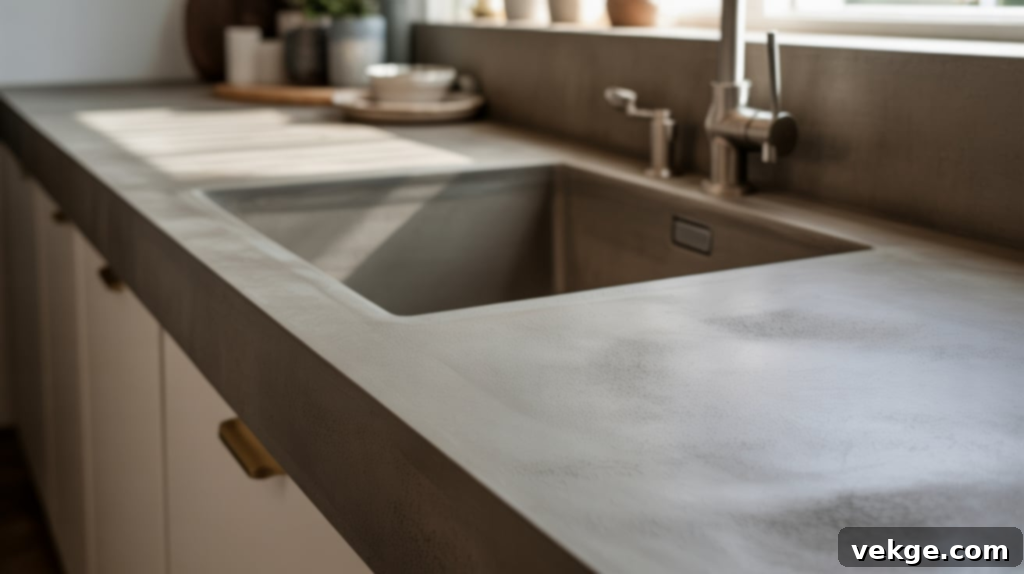
Custom concrete counters offer an unparalleled degree of design flexibility and a distinct industrial-chic aesthetic. They can be cast into virtually any shape, size, or thickness, making them perfect for unique kitchen layouts or integrated elements like sinks and drain boards. Homeowners can choose from an unlimited palette of colors, various textures (from smooth polished to subtly rough), and even embed unique aggregates like glass or shells, ensuring a truly bespoke surface that complements any kitchen style. Concrete is inherently durable and heat-resistant, giving it excellent functional properties.
While often costing less than natural stone, concrete countertops require skilled installation, which can be a significant portion of the overall cost. The material can be prone to cracking over time, especially if not properly reinforced or installed. Furthermore, concrete is porous and requires regular sealing to prevent staining and maintain its appearance. Despite these maintenance requirements, concrete’s customizability and robust, modern appeal make it an attractive option for contemporary, industrial, or artistic kitchen designs.
2. Solid Surface (Corian) Countertops: Seamless and Repairable
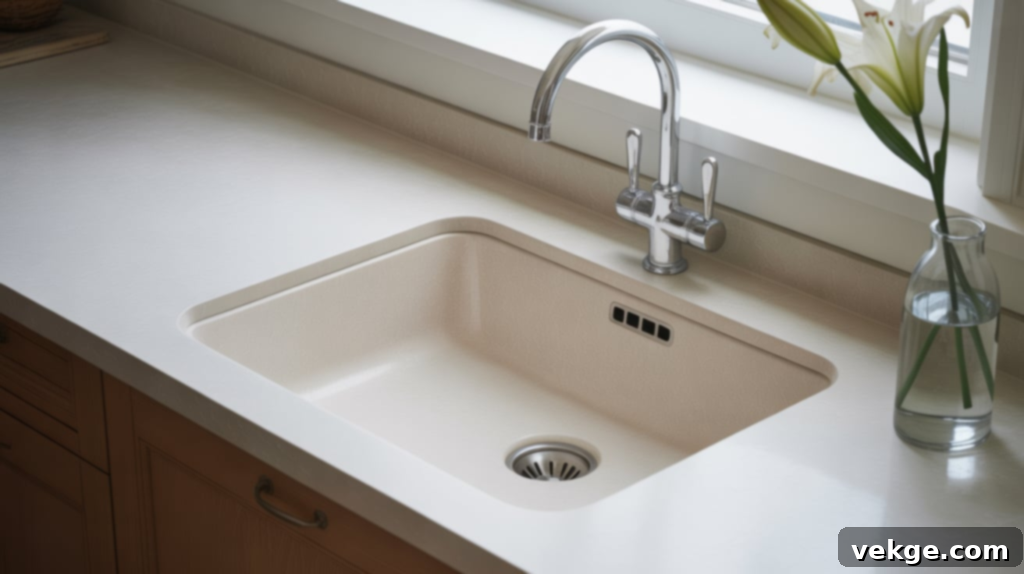
Solid surface materials, often referred to by the brand name Corian, are composed of acrylic or polyester resins blended with bauxite filler. This engineered material is highly valued for its seamless appearance and the ability to be molded and shaped like plastic, allowing for integrated sinks and backsplashes that eliminate visible seams where dirt and grime can accumulate. Solid surface is non-porous, making it inherently hygienic, resistant to bacteria, and easy to clean, without the need for sealing. Its most remarkable feature is its repairability: scratches, minor burns, and chips can often be sanded out by professionals, or even DIY with the right tools, restoring the surface to its original condition.
Corian and similar solid surface products typically cost more than laminate but are generally more affordable than natural stone or quartz. They come in an extensive range of colors and patterns, though they may lack the natural depth and variation found in real stone. While moderately durable, they are not as heat or scratch-resistant as quartz or granite. Solid surface is an excellent choice for homeowners prioritizing hygiene, seamless aesthetics, and a material that can be easily repaired, fitting well into modern and transitional kitchen designs.
3. Recycled Glass Countertops: Eco-Friendly Sparkle
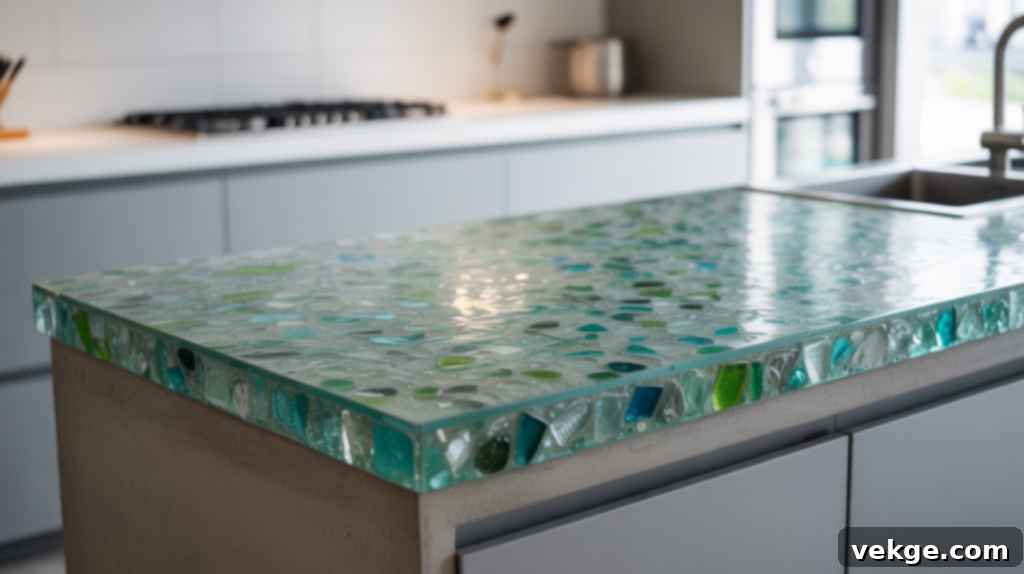
Recycled glass countertops offer a stunning and environmentally friendly option for your kitchen. These unique surfaces are created by combining colorful glass chips—sourced from post-consumer and post-industrial waste—with either cement or resin binders. The result is a vibrant, often sparkling surface that adds a distinct character and a touch of eco-conscious luxury to any space. Each piece is truly unique, with the arrangement and size of the glass fragments creating mesmerizing patterns and textures that catch the light beautifully.
Recycled glass is highly durable, heat-resistant, and, depending on the binder used, can be non-porous and resistant to stains and bacteria. When made with a resin binder, it behaves similarly to quartz in terms of maintenance. If a cement binder is used, it may require periodic sealing. This material typically costs about the same as quartz, positioning it in the mid-to-high price range, but with more limited availability compared to more common options. Each countertop piece boasts slight variations in color and texture, guaranteeing a one-of-a-kind installation that makes a bold statement while contributing to sustainable design practices.
Key Factors to Consider When Choosing Your Countertops
Beyond understanding the materials themselves, your personal circumstances will heavily influence the best choice for your home. Keep these critical factors in mind as you narrow down your options:
- Budget: Countertop prices vary dramatically. Establish a realistic budget early on, remembering to factor in not just the material cost but also fabrication and installation.
- Lifestyle and Usage: How do you use your kitchen? If you’re an avid cook, baker, or frequently entertain, you’ll need a highly durable, heat-resistant, and easy-to-clean surface. If your kitchen is more for show or light use, you might prioritize aesthetics over extreme resilience.
- Maintenance Commitment: Are you willing to seal your countertops periodically, or would you prefer a truly maintenance-free option? Some materials require more diligent care than others.
- Aesthetics and Design Style: Your countertops should complement your cabinets, flooring, and overall kitchen aesthetic. Consider color, pattern, texture, and how the material contributes to the desired look and feel of your space.
- Durability and Longevity: How long do you expect your countertops to last? Some materials are incredibly long-lasting, while others may show wear sooner. Consider resistance to scratches, heat, stains, and impact.
- Resale Value: If you plan to sell your home in the future, investing in popular, high-quality materials like quartz or granite can positively impact your home’s appeal and resale value.
How to Effectively Sample Countertop Materials Before Committing
Making a final decision on countertops can feel monumental, so taking the time to sample materials properly is crucial. Don’t rush this step—it can save you from potential regret.
- Request Large Samples: Small chips don’t accurately represent the full pattern, veining, or color variations of a slab. Ask for the largest samples available and take them home for several days.
- Test Under Actual Lighting Conditions: Kitchen lighting, both natural and artificial, drastically affects how colors and patterns appear. Observe the samples throughout the day and evening in your actual kitchen environment.
- Coordinate with Other Finishes: Place samples directly against your cabinet doors, backsplash materials, and even flooring samples. This allows you to visualize how all elements will harmoniously come together.
- Perform Real-World Stain Tests: With permission from the supplier (or on a sacrificial portion of the sample), try cleaning common staining substances like coffee, wine, oil, or lemon juice on your samples. This will reveal how each material truly handles real-world messes and give you a realistic expectation of maintenance.
- Visit Homes with Preferred Materials: If possible, ask your designer or contractor if they can arrange for you to see installations of your preferred materials in other homes. Photos can be deceiving; seeing a surface in a full-scale kitchen provides the best sense of its true appearance, texture, and feel.
Common Mistakes to Avoid When Selecting Countertops
Navigating the world of countertops can be tricky, and some common pitfalls can lead to dissatisfaction. Be aware of these mistakes to ensure a smoother selection process:
- Choosing Based on Appearance Alone: While aesthetics are important, prioritizing looks over functionality can lead to frustration. Always consider your cooking habits, family lifestyle, and willingness to maintain the material first. A beautiful countertop that doesn’t stand up to your daily life will quickly lose its appeal.
- Selecting Countertops Before Other Kitchen Elements: Your countertops are a significant visual component, but they need to integrate with the rest of your kitchen. Avoid making a final countertop decision before you’ve finalized your cabinet colors, flooring, and backsplash, as these elements should coordinate seamlessly.
- Assuming All Slabs of Natural Stone or Engineered Quartz are Identical: Even within the same material and color name, natural stone slabs (like granite, marble, quartzite) have unique variations in veining, pattern, and color. Similarly, engineered quartz can have subtle batch differences. Always visit showrooms or slab yards to view the actual slabs you intend to purchase.
- Opting for the Cheapest Installation for Expensive Materials: High-quality countertop materials require expert fabrication and installation. Skimping on installation costs for an expensive stone or engineered surface can lead to poor seams, improper leveling, or damage, ultimately ruining the investment you’ve made in the material itself. Invest in reputable professionals.
Final Thoughts: Your Perfect Countertop Awaits
Now that you’ve journeyed through the diverse world of countertop materials, exploring their unique strengths, challenges, and ideal applications, I hope you feel significantly more confident and empowered to make the best choice for your home. Remember, there’s no single “best” countertop material; rather, the perfect one is the one that aligns most closely with your personal preferences, your family’s lifestyle, your design aesthetic, and your budget.
Each material—from the timeless elegance of granite and the modern resilience of quartz to the warm practicality of butcher block and the eco-chic appeal of recycled glass—brings its own character and functionality to the table. The right choice isn’t just about how it looks; it’s about how it fits into your daily life, how it feels to cook on, and how it contributes to the overall joy and efficiency of your kitchen.
Don’t feel pressured to follow fleeting trends or simply go with what’s most popular. Take your time, ask plenty of questions, gather samples, and trust your instincts about what truly feels right for you and your unique home. Your kitchen countertops are a long-term investment that will be a central part of countless memories, so choose wisely and enjoy the process of creating a space you’ll love for years to come. If you’re still contemplating your options or seeking more inspiration, feel free to explore additional resources and ideas to guide your next step.
